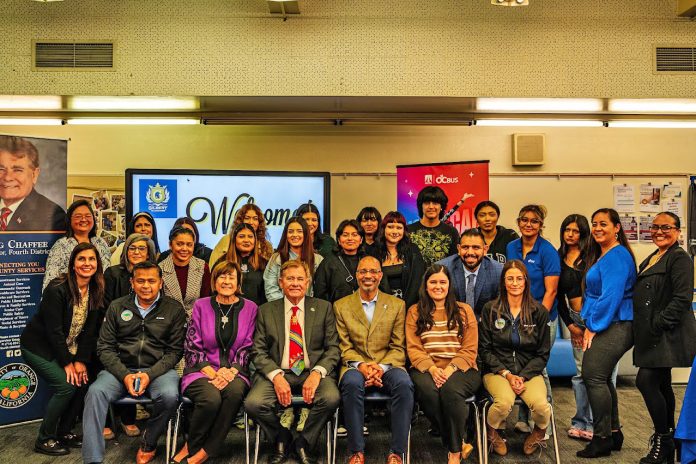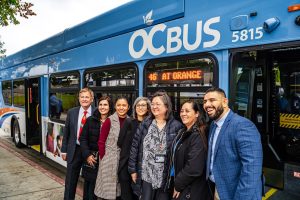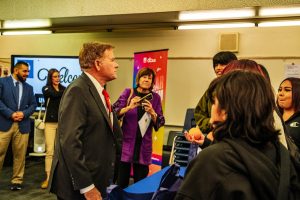
Top government officials came to Gilbert High School in Anaheim last Wednesday to catch a bus.
It was not a school bus but an Orange County Transportation Agency bus that was now arriving on a schedule suitable to students.
Following a successful civic engagement project, the students of Gilbert High School, an alternative school focused on civic engagement, successfully petitioned, then worked with the staff of the Orange County Transportation Authority, to change its schedule to accommodate students.
Students and government officials waited at Bus Stop 46 outside the school on Ball Road as right on time, the honorary bus pulled into the station. Students expressed satisfaction that this small change will make a big difference in many of their lives.
In actuality, it will give them approximately 15 additional minutes to make the bus to get home on time rather than getting home, in some cases 45 minutes to an hour later.

Gilbert Principal Jose Lara says he and the teachers are very proud of what students have been able to accomplish.
“We’re part of a district that champions civic engagement,” said Principal Lara at a ceremony before the bus arrived on its new schedule Wednesday afternoon.
“Our teachers are trained in civic learning and civic engagement, and we have a program here that requires all students to participate in a civic engagement project as part of the educational curriculum,” he said.
Gilbert is an alternative school that allows students needing to make up credits to do so, said Lara.
As a school dedicated to civic engagement, he says the students are surveyed at the beginning of the year to find a project of interest to them, the principal said.
This year, said Lara, “a group of students advocating for themselves let teachers know that transportation was an issue for them. The bus lines and the times they ran by the school; very important to our students.”
At issue was the 2:22 p.m. afternoon OCTA bus. Students said the bell to end school rings shortly before then and there was not enough time to make the bus, causing problems for many students and forcing them to get home late.

Photo by Logan Ueno
Student Ruby Monzentini said the Bus 46 schedule has to be changed, not by a whole lot but enough to let us be able to make it on time to get to our homes safely and on time.
“Consider changing the bus schedule by adding 10 minutes to the current arrival time to allow my peers to get to the bus,” asked Julianamaria Irineo-Alcala.
Student Alexis Diaz complained that “the bus arrives two minutes before my dismissal time and the students at my school are feeling the need to leave their last class early to catch the bus on time and to get home on time. If you could change the time to 10 minutes later it would help the students at my school.”
OCTA officials acknowledge that many students who are not able to utilize school buses utilize the Orange County Transportation Authority system. Students aged 6-18 can take advantage of the “Youth Ride Free” program to get back and forth to schools, OCTA officials say.
“When we asked students in a school-wide survey what they wanted to see, this is the issue that came up most,” said Lara, so transportation issues became this year’s project.
Each year, teachers at Gilbert design civic engagement lesson plans based on the projects selected by students. Teachers who are trained to teach civic engagement and civic learning, began drawing up lesson plans on transportation, who runs it, how the system works, who has the power to change bus routes, assigns the times, etc.
“In addition, once we choose a topic, we begin reaching out to political leaders, government agencies, even setting up meetings,” Lara said.
Lara said the students created an online petition and began encouraging other students to sign it. In addition, they launched an email campaign to elected officials.
(L-R) O.C. Supervisor Doug Chaffee, Gilbert HS Assistant Principal Lupe Serrano, teacher Maribel Arvizu, teacher Rebecca Alcala, teacher April Baker Buker, teacher Nikki Resch and Gilbert High School Principal Jose Lara. Photo courtesy of Logan Ueno.
Orange County Supervisor Doug Chaffee was one of the elected officials students contacted and said he immediately noticed. “All of a sudden, I got forty emails,” said Chaffee, who represents the 4th District of the O.C. Board of Supervisors.
Chaffee recounted the story of how he became involved in helping the students as he attended the student assembly, which was livestreamed so everyone could take part. Chaffee, Vice Chairman of the O.C. Board of Supervisors, was recently also elected Vice Chair of OCTA, so he was in a position to help.
Johnny Dunning, Jr., OCTA’s Chief Operating Officer, who was also present at the Gilbert High School event, acknowledged his staff worked with the students to adjust the schedule.
“Our first thought was to simply extend the schedule of the 2:22 p.m. bus so it would arrive later, but the OCTA staff eventually determined that would not work,” said Dunning.
After the staff studied further, he said, they eventually arrived at a temporary solution that had a later bus adjust its schedule so it could hit the school bus stop a few minutes after the Gilbert dismissal bell had rung.
In essence, OCTA will add a temporary “tripper” bus to the route to accommodate the students by February 2024 and make a permanent solution in spring 2024.
“This is an example of how we always want to engage with our riders,” said Dunning.
Chaffee congratulated the students and said OCTA is now working on a more permanent solution for the Gilbert High School students.
“OCTA worked out a temporary solution, and we will work on a more permanent solution when planners begin working on schedules for next year,” Chaffee said.
“Students have the power to make a positive impact by engaging themselves in their community,” said Chaffee, reminding them “you are the future leaders and decision-makers.”
“I always want you to keep looking for ways to better your community,” he told them.
Students who participated in the program said being involved in the project made them feel proud of the accomplishment and taught them lessons for the future.
“I feel like we were able to communicate as a team about these buses and make it an issue. Students have obligations that depend on the buses, many times to get home to younger siblings to care for them,” said student Maggali Rodriguez.
Student Emily Dema said overall, the project was rewarding, noting that as students, they truly felt like they were being heard by authorities.
“We finally got to the point where we were able to get to the government and felt like we were being heard,” she said.
